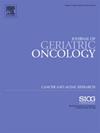入住疗养院的晚期癌症患者在生命最后一个月的住院情况。
IF 3
3区 医学
Q3 GERIATRICS & GERONTOLOGY
引用次数: 0
摘要
导言:多项研究显示,临终患者存在过度治疗和频繁入院的情况,包括在养老院(NH)环境中。然而,对于患有晚期癌症的疗养院居民的过度治疗,以前还没有过研究。我们的目的是比较患有或未患有晚期癌症的 NH 居民在生命最后一个月的急诊室就诊和入院情况以及死亡地点:这项回顾性研究基于斯德哥尔摩地区 2015 年至 2019 年的行政数据库。提取了每位受试者的人口统计学数据、急诊室就诊情况和医院虚弱风险评分(HFRS)。进行了单变量和多变量分析,并计算了几率比(OR):共发现了 30,324 名新罕布什尔州居民,其中 1807 人患有晚期癌症。在单变量分析中,晚期癌症与生命中最后一个月到急诊室就诊的次数较多有关,但在对年龄、性别和虚弱风险进行调整后,则与之无关,调整后的aOR为1.07(95 %CI 0.97-1.19)。癌症诊断与急性入院治疗有明显相关性,但相关性较弱,aOR 为 1.13(95 %CI 1.02-1.26)。与非癌症居民相比,患有晚期癌症的 NH 居民在医院死亡的可能性较低:aOR 为 0.63(95 %CI 为 0.54-0.73):讨论:与非癌症居民相比,患有晚期癌症的新罕布什尔州居民在生命最后一个月入院的风险略高,但死于医院的可能性较低。患有癌症和未患癌症的北卡罗来纳州居民在生命最后一个月到急诊室就诊的概率相似。本文章由计算机程序翻译,如有差异,请以英文原文为准。
Hospital admissions in the last month of life for patients with advanced cancer residing in nursing homes
Introduction
Overtreatment and frequent hospital admissions in patients at end-of-life has been shown in several studies, including in the nursing home (NH) setting. However, overtreatment in NH residents with advanced cancer has not been studied before. Our objective was to compare emergency room (ER) visits and hospital admissions in the last month of life and place of death among NH residents with or without advanced cancer.
Materials and Methods
This retrospective study is based on Region Stockholm's administrative database from 2015 to 2019. Demographic data, ER visits, and Hospital Frailty Risk Score (HFRS) were extracted for each subject. Univariable and multivariable analyses were performed, and odds ratios (OR) calculated.
Results
In total, 30,324 NH residents were identified, of which 1807 had advanced cancer. Advanced cancer was associated with more ER visits in the last month of life in the univariable analysis but not when adjusted for age, sex, and risk of frailty with an adjusted aOR of 1.07 (95 %CI 0.97–1.19). Having a cancer diagnosis was significantly associated with acute hospital admissions, although the association was rather weak with an aOR 1.13 (95 %CI 1.02–1.26). NH residents with advanced cancer were less likely to die in hospital than non-cancer residents: aOR 0.63 (95 %CI 0.54–0.73).
Discussion
NH residents with advanced cancer have a slightly higher risk of hospital admissions in the last month of life compared to non-cancer residents but are less likely to die in hospital. The probability of ER visits during the last month of life was similar between NH residents with and without cancer.
求助全文
通过发布文献求助,成功后即可免费获取论文全文。
去求助
来源期刊

Journal of geriatric oncology
ONCOLOGY-GERIATRICS & GERONTOLOGY
CiteScore
5.30
自引率
10.00%
发文量
379
审稿时长
80 days
期刊介绍:
The Journal of Geriatric Oncology is an international, multidisciplinary journal which is focused on advancing research in the treatment and survivorship issues of older adults with cancer, as well as literature relevant to education and policy development in geriatric oncology.
The journal welcomes the submission of manuscripts in the following categories:
• Original research articles
• Review articles
• Clinical trials
• Education and training articles
• Short communications
• Perspectives
• Meeting reports
• Letters to the Editor.
 求助内容:
求助内容: 应助结果提醒方式:
应助结果提醒方式:


